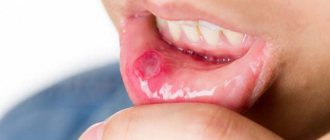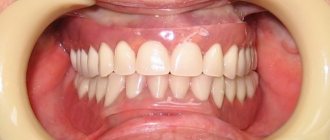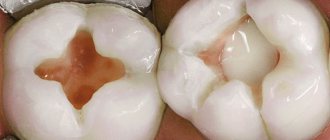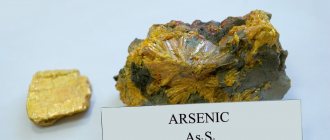Cloves have long been used in folk medicine for pain relief and as an antiseptic. Dry and fresh clove buds effectively relieve toothache. Chinese doctors in 200 BC. It was known that cloves do not completely cure toothache, but significantly reduce pain. A decoction from the plant effectively freshens breath. Dentists in the 19th century used clove oil as a means to relieve pain and reduce pain before and after tooth extraction procedures. Currently, the spice is used as an effective folk remedy, acting as a local anesthetic.
Main types of essential oils
The most effective for gums are oils made from the bark of trees such as oak, sea buckthorn, and anise. Essential oils are most often used for diseases of the oral mucosa, periodontitis, stomatitis, and bad breath.
For caries, it is best to use tea tree oil; it is especially noteworthy for its antiseptic properties and ability to fight viruses and bacteria. This oil also fights warts, various oral infections, insect bites, destroys tartar, and strengthens teeth and gums.
You can use it to remove plaque. To do this, first brush your teeth with toothpaste, and then apply a few drops of tree oil to your toothbrush and brush your teeth again. To enhance the whitening effect, you can add a few drops of orange oil.
EMERGENCY CARE FOR TOOTH PAIN
CORRECT TACTICS
Prevention is better than cure, so you need to pay enough attention to your teeth and gums so as not to face various problems. In the assortment portfolio of a modern pharmacy, you can now purchase a lot for careful oral care: mouthwash, toothpastes with the addition of necessary microelements and extracts of herbs, oak bark, etc., various types of toothbrushes, dental floss for cleaning from food debris.
The rules for caring for teeth and gums are simple:
√ Consume less sweet foods and drinks. Sweets in themselves are not very beneficial for the whole body, and even more so for teeth, which will be the first to be subject to destruction and rotting.
√ Take proper care of your teeth. Clean them (preferably) three times a day, but at least twice (in the morning and before bed). Make sure that the correct toothbrush is used for the type of teeth and gums (ideally, use a soft one). It is very important to master the correct cleaning technique: without using force, make circular movements, and not from side to side. When cleaning chewing surfaces, use straight strokes. The cleansing process should take about three minutes.
√ Use dental floss for areas that a toothbrush cannot reach.
√ Visit the dentist twice a year, even if you don’t feel any problems with your teeth.
CAUSES OF SUFFERING
Pain inside and around the tooth is a serious cause for distress. Its severity ranges from mild discomfort to excruciating pain that makes it difficult to do everyday things such as eating, oral hygiene, and more. etc. In addition, toothache forces you to concentrate all your attention on yourself, which causes even more unpleasant physical sensations in people who are susceptible to psychological experiences and do not know how to relax.
This malaise causes a lot of unpleasant, painful sensations, especially during eating, and may not stop during the day or flare up with renewed vigor at night. A damaged tooth often reacts to hot, cold, and sour things.
In short, there are more than enough reasons for suffering. What factors can cause toothache?
√ Loss of filling.
√ Loose or broken living tooth, implant. This happens if you bite hard on something hard, or as a result of injury.
√ Tooth decay occurs due to the presence and growth of bacteria that produce harmful acids that destroy tooth enamel, which in turn leads to caries.
√ Exposed tooth root due to improper brushing. Also, the tooth root can be affected by the destruction of the crown and inflammation of the gums. This is generally common with hypersensitivity.
√ The dental nerve is affected (with any tooth decay).
√ Wisdom tooth.
√ Untreated dental abscess.
√ Inflammation of the gums around the damaged tooth, ulcers on the gums, formation of pus.
√Damaged pulp (the core of the tooth), it contains blood vessels and nerves. When the pulp is inflamed, pain is felt in the jaw and can be transmitted to certain areas of the face.
√ Weather changes. Some people experience this relationship (temperature fluctuations), but in most such cases the pain is short-term.
√ Unhealthy diet (excessive consumption of sweets) and lack of hygiene.
PREPARATION FOR PROCEDURES
- If the discomfort is caused by a broken tooth or damaged filling, naturally, you cannot do without the help of a dentist.
- However, in an emergency situation, when there is no way to see a doctor, you can do it on your own.
- First you need to rinse your mouth with warm salt water and brush your teeth with a toothbrush and dental floss. If you have sensitive teeth, avoid industrial rinses with harsh chemicals. They can make the pain worse.
ALWAYS AT HAND
√ Ice is a kind of anesthesia; you can use an ice cube both outside and inside the mouth, applying it for 5–7 minutes. and listening to your feelings.
√ Press a warm tea bag onto the painful tooth. Or rinse your mouth with freshly brewed warm tea.
√ Salt and pepper. Mix 1/4 tsp. salt and pepper with a few drops of water until thick. Apply this paste to the damaged tooth.
√ Alcohol (vodka, whiskey, cognac, alcohol) can be used as an anesthetic by rinsing your mouth for a minute. Or soak a cotton pad and apply it to the sore spot.
√ Vanilla extract, due to its alcohol content, destroys bacteria on inflamed gums. It is enough to hold a cotton pad with a few drops of extract on it to relieve pain.
OILS - FAITHFUL ASSISTANTS
√ Sunflower oil.
Rinse your mouth with 1 tbsp for a few minutes.
√ Sesame oil
- used in the same way as sunflower.
√ Oregano oil
has antibiotic properties. Place a few drops under your tongue and hold for a while. Repeat the procedure every hour. You can rinse your mouth with oil (but do not use more than 230 ml per day).
√ Nutmeg oil
also effective. A drop of oil is applied to the damaged tooth several times a day as needed.
√ Tea tree oil.
Place 1-2 drops on the affected area, apply a cotton swab with a few drops, or add to warm water to rinse.
√ Clove oil
. Eugenol is the main valuable component of clove oil and is often an important component of medicinal and oral hygiene products.
√ Peppermint oil
Its properties are similar to cloves: it relieves pain, soothes, and relieves inflammation.
√ Lavender and chamomile
, or rather, the essential oils of these plants are an excellent combination for soothing pain and relieving discomfort.
OPENING THE FRIDGE
Garlic
- one of the powerful natural antibiotics and an effective remedy for toothache. Crushed garlic releases two substances that are converted into allicin. This substance is known for its antibiotic and analgesic properties.
However, garlic can irritate the gums, so it is necessary to apply it directly to the crown of the tooth, avoiding contact with the gums.
Limes and lemons
, according to scientific research, can relieve toothache due to the content of vitamin C. To have an effect, a piece of lemon or lime is placed in the affected area. Another option is to squeeze a little juice onto a cotton pad and wipe the sore area. A paste made from a mixture of lemon juice and salt also helps.
Onion
in its raw form it is recommended even by dentists. It is known for its antimicrobial properties. Those who suffered from toothache claim that if they chew a piece of onion, abscesses in the mouth, swelling and pain will disappear.
Cucumber
- alternately apply thick slices of the vegetable to the damaged tooth.
Spinach leaves
can also be chewed to relieve pain. Or make a paste from them (grind the leaves) and apply to the sore tooth or gum.
wheat sprouts
- a natural antibiotic that destroys harmful bacteria in the mouth and removes toxins. Wheatgrass juice is used as a gargle, and the sprouts themselves can be chewed.
Potato
- Apply a piece of raw potato to the sore spot for 15 minutes.
Cabbage
- an excellent healer! It will help get rid of toothache and has anti-inflammatory properties. A softened piece of cabbage leaf is placed between the diseased tooth and gum.
SPICES AND HERBS
The most unpleasant thing is that toothache can not only be unbearable, but also occur late in the evening, when you can no longer get to the dentist. In such cases, medicinal herbs and spices will bring relief.
Ginger.
Using the root of this plant is one of the most common natural aids that has been used for many decades. Peel the skin from the plant, cut a piece, apply it to the damaged tooth and chew. Apply fresh root as needed.
Turmeric
has many beneficial properties, and one of them is the fight against various ailments in the oral cavity (toothache, abscesses, infections of the gums and teeth).
Hydrastis
(Canadian goldenseal) contains berberine, an effective substance against various types of bacteria. They treat sore throats and various infections, in particular oral ones.
Thyme
also recommended in the treatment of toothache. According to research, this spice has antiseptic, antifungal and medicinal properties that make it effective against gum inflammation and tooth decay. When combined with fenugreek, thyme treats infections, and when combined with mint, it destroys bacteria and reduces inflammation.
Spilanthes
- undoubtedly one of the most effective painkillers for toothache.
Yarrow
acts very quickly, bringing temporary relief from problems with teeth and gums. You just need to chew fresh leaves, apply them to the affected area, or prepare a rinse (infusion).
Carnation.
Whole or crushed dried buds have anesthetic and antimicrobial properties. As a quick fix, it is recommended to chew the spice for a while.
Mint
(leaves). The following home remedy helps well: 2 crushed mint leaves (fresh) are applied to the sore spot for a few minutes, and then rinse your mouth with a saline solution (2 teaspoons of salt per glass of water).
DO NOT GIVE UP!
As a rule, toothache occurs at night due to increased blood flow to the head. Keep your head elevated while sleeping. This will relieve some of the pressure.
If your toothache gets worse, try pain relief medications ( ibuprofen, naproxen, codeine, Tylenol, aspirin, acetaminophen)
).
Taking good care of your teeth is not about overcoming the pain on your own. After all, she might come back and take you by surprise again. Be sure to visit a dentist so that the consequences do not become more serious.
Benefits of clove essential oil
It helps relieve throbbing pain in the tooth, thanks to a substance in its composition called eugenol. Clove oil is obtained from the clove tree, using the buds, leaves and the tree trunk itself. Clove oil fights gum inflammation and has analgesic and antiseptic properties.
It can be prepared at home, for this you need to take edible cloves, throw five buds into one glass of vegetable oil and boil, then cool and apply a cotton swab dipped in this oil to the sore tooth.
Clove tincture
Clove tincture has healing properties. It can be used to prevent colds and viral diseases, increase immunity, for bronchitis, and sore throat. The remedy is also taken for neuroses. The product is used externally for arthritis and rheumatism.
To prepare the tincture at home, use the recipe below.
Ingredients:
- Cloves - 25 buds.
- Vodka - 250 ml.
How to prepare: Pour cloves into a glass container and fill with vodka. Close the jar with a lid. Leave the product for a week, shaking occasionally.
How to use: Take tincture 1 tsp. before eating.
Fir essential oil
Fir oil copes with diseases such as gingivitis, periodontal disease, and stomatitis. Dental treatment with this oil is carried out by massaging the gums; a bandage is secured on the index finger, a few drops of oil are applied to it and the gums are massaged in a circular motion. At the same time, you should not hope for instant healing of the gums; you must undergo a course of treatment, massage of the gums with fir oil for at least twenty days. You can also apply tampons soaked in oil to the painful tooth, this will help relieve toothache, especially if it prevents you from falling asleep at night.
Sage is also used, it is known for its ability to relieve gum inflammation. For treatment, you will need to make an infusion, preferably in a thermos. To do this, you need to take one part of the plant and pour five parts of boiling water, leave for at least an hour. You can use sage oil to relieve inflammation. Sage helps gums stop bleeding, protects against unpleasant odor when rinsing, and fights stomatitis when taken orally and applied to a cotton swab and used as a lotion.
Despite their tangible benefits, it is not worth choosing essential oils yourself for prevention and treatment. It is better to consult a doctor who will prescribe a specific type of essential oil to use so that it has the maximum benefit on your dental health.
Treatment with cloves
You can start therapy with the product only after a doctor’s prescription. You should also read the list of contraindications. Below are recipes for preparing clove-based remedies for various ailments.
From parasites
Cloves should be used against worms only after parasites have been identified in the body. To do this, you will need to undergo the appropriate tests, as well as obtain permission from your doctor.
Below we will tell you how to prepare and how to take medicinal remedies for parasites.
Recipe No. 1
Ingredients:
- Wormwood - 20 g.
- Tansy - 20 g.
- Cloves - 20 g.
How to prepare: Grind each ingredient separately in a coffee grinder. Then mix them.
How to use: On the first day, eat half a dessert spoon of the medicine 30 minutes before dinner. On the second day - half a dessert spoon 30 minutes before breakfast and dinner. From the third to the ninth day - half a dessert spoon three times a day 30 minutes before meals.
Result: Getting rid of parasites.
Recipe No. 2
Ingredients:
- Cloves - 100 g.
- Flax seed - 100 g.
How to prepare: Grind the ingredients in a coffee grinder. Place the resulting mixture in an airtight container and place in a cool place.
How to use: Take 25 g of the medicine every day, diluting it in tea or fruit drink. The duration of treatment is 3 days, after which take a break for 3 days. Then repeat the treatment again. The general course of treatment is 1-2 months.
Result: Elimination of helminths.
From pain
Cloves effectively cope with various types of pain, such as headaches or menstrual pain. Below is a recipe for headaches.
Ingredients:
- Clove oil - 1 drop.
- Chamomile oil - 1 drop.
- Lavender essential oil – 3 drops.
- Almond oil - 5 g.
How to prepare: Mix the oils.
How to use: Massage your forehead and temples using a mixture of oils.
Result: Elimination of headaches.
From pressure
For low blood pressure, experts recommend taking clove decoction. The dosage and duration of treatment with the decoction is prescribed by the doctor.
Ingredients:
- Ground cloves - 3 g.
- Water - 250 ml.
How to prepare: Boil water, then pour boiling water over the spice. Leave the broth for 1 hour, then strain.
How to use: Take 1 tsp decoction. three times a day.
Result: Normalization of blood pressure.
For sore throat
To eliminate a sore throat, just take 2 cloves, suck on them, then chew and swallow. Carry out this procedure until the inflammation disappears.
For diabetes
In medicine, cloves are actively used for diabetes. It lowers blood sugar levels, neutralizes the effects of histamine, and regulates the patient’s weight.
From the recipe below, you will learn how to drink cloves for type 2 diabetes.
Ingredients:
- Cloves - 20 buds.
- Water - 250 ml.
How to prepare: Pour hot water over the buds. Let the mixture sit for 12 hours, then strain.
How to use: Drink 75 ml infusion three times a day 20 minutes before meals.
Result: Maintaining optimal blood glucose levels.
For pancreatitis
Experts often recommend using clove infusion as part of complex treatment. The effectiveness of the product largely depends on whether you follow the recommended diet when you are sick.
The decoction recipe below should be used to treat chronic pancreatitis.
Ingredients:
- Cloves - 20 g.
- Water - 100 ml.
How to prepare: Pour cold boiled water over the cloves. Leave the product for 8 hours, then strain.
How to use: Take 1 tbsp infusion. three times a day.
Result: Elimination of symptoms of pancreatitis.
For women
The spice has a positive effect on the female body. In ancient times, cloves were used to stimulate labor, for uterine bleeding, and as an abortifacient.
Clove ether increases the tone of the uterus, normalizes the menstrual cycle and hormonal levels. Cloves also increase libido and prolong sexual pleasure.
Cloves are useful for menopause. It improves sleep, eliminates nervousness, and reduces the symptoms of menopause.
For men
Cloves have a positive effect on the male body. It increases sexual activity and potency, improves reproductive function. Also effective for prostatitis: normalizes blood circulation, eliminates pain and inflammation, suppresses the activity of bacteria.
Main causes and degrees of mobility
Before considering how to save a loose tooth, it is important to identify the main factor that caused it. Possible reasons include:
- mechanical damage (trauma). As a result of various bruises, damage to the periodontal tissues and root displacement occur. It is worth noting that if the tooth remains in the socket, it is enough to carry out strengthening procedures to save it;
- genetic predisposition. For patients with poor heredity at any age, it is important to take preventive measures to strengthen teeth in order to avoid problems in the future;
- periodontal diseases (for example, gingivitis, periodontal disease). They make the roots weak, causing bleeding and swelling. In the absence of timely treatment, the gums will become loose, which will lead to mobility and loss of teeth;
- bruxism (“teeth grinding”). Very often, bruxism bothers you at night. In such situations, it is recommended to wear special protective equipment during sleep;
- abuse of alcohol and tobacco products. They weaken the body’s protective properties and have a destructive effect on bone tissue, which can lead to instability;
- poor nutrition. People who abuse junk food, neglecting foods with healthy vitamins, minerals and trace elements, often complain of dental problems. In such situations, it is important to start eating a balanced diet and drinking a vitamin complex;
- systemic diseases (osteoporosis, thyroid dysfunction and other abnormalities of the endocrine system). They have a negative impact on the condition of the entire body;
- age. Over the years, due to deterioration of blood supply, bone tissue atrophy gradually occurs, which leads to loose teeth;
- low immunity (for example, due to recent chemotherapy). Since the body lacks the strength to resist, the most vulnerable parts suffer first, the oral cavity being one of them;
- pregnancy and lactation period. The body experiences an acute shortage of microelements and vitamins, and hormonal surges occur. This all affects the condition of the oral cavity;
- uncontrolled use of certain medications.
In this case, four degrees of mobility are distinguished. In the first, the teeth deviate slightly to the side (less than 1 mm). On the second, the amplitude increases (by more than 1 mm). On the third, they deviate in all directions. On the fourth, they are able to rotate around their axis. The answer to the main question: “if a molar tooth is very loose, can it be saved?” positive. But this requires long-term complex treatment.
^ How to choose cloves
A brittle, overly dry bud indicates a lack of essential oils. When you throw a high-quality kidney into water, it floats vertically, with its stem down, or sinks to the bottom of the glass. If the “clove” lies horizontally on the surface of the water, then there are no essential oils in it. Such cloves are not suitable for medicinal purposes.
Be healthy!
Author: Ekaterina Solovyova
Please note that the information presented on the site is for informational and educational purposes only and is not intended for self-diagnosis and self-medication. The selection and prescription of medications, treatment methods, as well as monitoring their use can only be carried out by the attending physician. Be sure to consult a specialist.
How to protect enamel
It is impossible to completely eliminate “harmful” foods from the diet, and it is not always necessary. You can maintain a healthy and beautiful smile by following simple rules.
The first thing you shouldn’t forget is personal hygiene
. It is advisable to brush your teeth after every meal to remove any leftover food. And if morning and evening care procedures involve the use of toothpaste and brushes, during the day it is useful to use dental floss, mouthwash and even chewing gum (the main thing is not to chew for a long time).
Use toothpicks carefully, and only if there is no other alternative. Do not try to remove stuck pieces with a fork, fingernails or sharp objects. This cleaning method will do more harm than good.
Second, it's diet.
. An excess of citrus fruits, frequent consumption of lemonade, hard foods (crackers, dried fruits, candies, etc.), alcohol contribute to the active spread of bacteria that destroy enamel. It is not necessary to completely eliminate foods from your diet unless otherwise recommended by your doctor, but it is worth reducing the frequency and volume of consumption.
What is good for enamel? Sun and vitamin D, strawberries and cottage cheese. These components contribute to the natural restoration of enamel and strengthen it.
Third. Don't forget to seek help and advice from your dentist. The doctor will tell you how to properly care for your mouth and help you choose a restorative (not just cosmetic) toothpaste for regular use.
In addition, in the dental office you will have professional teeth cleaning (it is recommended to do it 1-2 times a year) and remineralization - the process of restoring enamel with the help of special preparations, including fluoride-containing ones.
Number of views 3,745
^ Chemical composition of fragrant cloves
Just one bud, but what a variety of nutrients! The chemical composition of cloves is unusually large. Its beneficial properties are explained by the high content of vitamins, minerals and, of course, essential oil. Vitamins of clove buds: provitamin A (beta-carotene), B vitamins (B1, B2, B3 or PP, B4, B6, B9), vitamin C (ascorbic acid), vitamin E (tocopherol) and vitamin K (phylloquinone). Cloves contain useful minerals: potassium, calcium, sodium, magnesium, phosphorus, iron, manganese, copper, selenium, zinc. It contains a considerable amount of Omega-3 and Omega-6 polyunsaturated fatty acids. 20% of one bud is essential oil, containing aromatic substances eugenol, caryophyllene, ylangene, etc. Cloves contain the same amount of tannins, as well as glycosides and mucus. If we consider the content of proteins, fats and carbohydrates, then cloves contain 6% proteins, 20% lipids, and about 27% carbohydrates. Approximately 30% of the spice is fiber.











